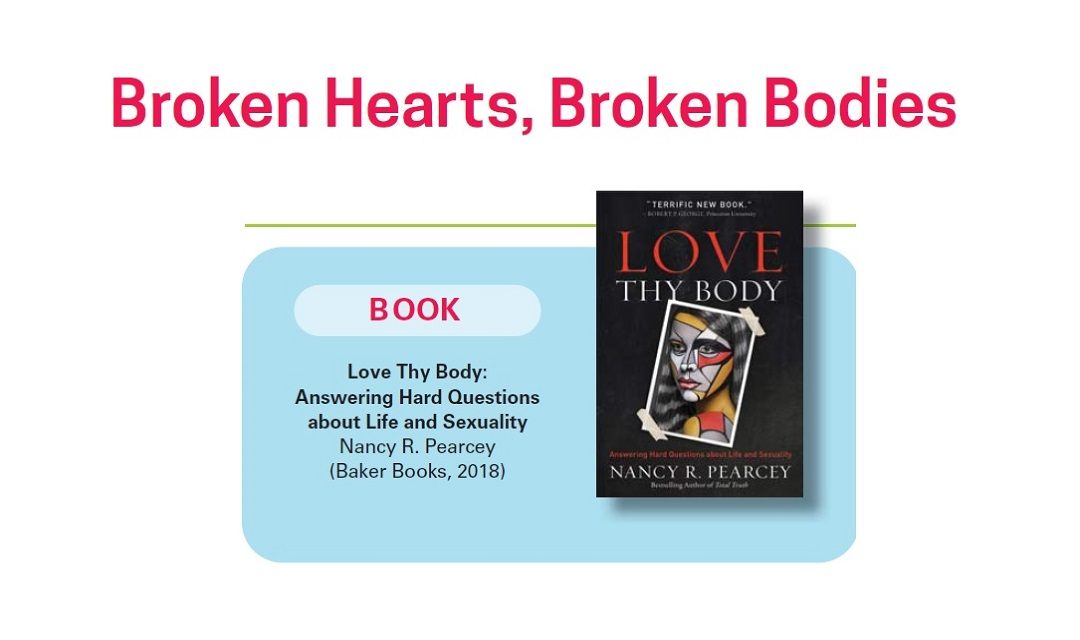This article first appeared in the Christian Research Journal, volume 41, number 2 (2018). For further information or to subscribe to the Christian Research Journal please click here.
a book review of
Love Thy Body
Answering Hard Questions about Life and Sexuality
by Nancy R. Pearcey
(Baker, 2018)
What do abortion, euthanasia, homosexuality, transgenderism, and the hook-up culture have in common? All are hot-button issues that treat the body as separate from a person’s true identity. This separation, while ostensibly progressive, is dehumanizing because it relegates the body to mere material matter that can be manipulated to serve one’s desires.
Nancy Pearcey, in her book Love Thy Body, confronts these issues head-on by uprooting their core premises whose seeds were planted during the Enlightenment, grew during post–World War modernity, and came to fruition in the sexual revolution and counterculture.
Pearcey makes a compelling case for the Judeo-Christian worldview that treats human beings holistically as both physical and spiritual (p. 48). Rather than denigrating the body, Christianity considers the body an integral part of our identity.
Upper/Lower Story. In her book Total Truth, Pearcey popularized the concept of the two-story approach to reality that was first described by Herman Dooyeweerd and later by Francis Schaeffer. The two-story concept, known as the fact–value split, is the basis of a secular worldview. Facts belong in the lower story and are objective. Values belong in the upper story and are subjective.
In Love Thy Body, Pearcey demonstrates that this fragmented view of reality leads to a fragmented view of the self. The body is defined by the “facts” realm, while the person is defined in a “values” realm. The lower story is subject to empirical science, while the upper story is the basis for rights (14).
Pearcey shows how secular bioethics exemplifies this two-story concept in the form of Personhood Theory. The debate is not the fact that an embryo is biologically human, but whether it counts as a person (51). This same two-story concept applies to people in a persistent vegetative state. They are deemed human nonpersons because they are biologically human but lack a certain level of cognitive ability. With such subjective standards, one must earn the right to be considered a person (25).
This is in contrast to a Christian worldview, which is inclusive and holistic because the mere fact of being human qualifies someone for personhood. The idea of inalienable human rights is predicated on a worldview that assumes all people have inherent dignity (102).
Modern views on sexuality have succumbed to a two-story view of reality. The hook-up culture is predicated on dividing personal feelings and the physical body, where sex is no longer part of a relationship but is an activity where two people agree to meet each other’s physical needs.
Homosexuality, as well, rends the person in two. Even though the body’s design indicates that men and women complement each other, it is a person’s feelings that indicate their true identity.
Pearcey’s goal is not to argue whether someone is born with same-sex attraction or as transgender but to show that feelings change, while the body fundamentally does not. This does not mean we are slaves to our biology. Rather, as the Christian worldview shows, our biology is an integral part of our identity because nature has a certain telos to it, and that telos informs how we were meant to be (29).
Compassion and Dignity. What I enjoy about Nancy Pearcey’s writings is how she traces the history of ideas to our present-day cultural mindset. Early Christians placed a high value on the body because God Himself became flesh. This idea was anathema to the Gnostic view, prevalent at the time, which said the body was wholly corrupt. Our current culture similarly sees the body as something that can be used, abused, and manipulated so long as it serves the will.
Love Thy Body tackles the hot-button topics of our day by digging below the surface to expose the worldview informing our culture’s antagonism toward the body. Pearcey and Christianity offer compassion and dignity for captives of this dehumanizing worldview. “The goal is not to win a culture war or to impose our views on others but to love our neighbor, which means working for our neighbor’s good” (46).
—Heather Zeiger
Heather Zeiger is a science writer. She holds an MS in chemistry and an MA in bioethics.









